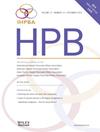胰腺导管腺癌患者接受新辅助化疗后肿瘤病理反应良好的相关因素
IF 2.7
3区 医学
Q2 GASTROENTEROLOGY & HEPATOLOGY
引用次数: 0
摘要
胰腺导管腺癌(PDAC)对新辅助化疗(NAT)的病理反应与肿瘤预后有关。该研究旨在调查接受胰腺切除术治疗的胰腺导管腺癌患者肿瘤消退的相关因素。本文章由计算机程序翻译,如有差异,请以英文原文为准。
Factors associated with favourable pathological tumour response after neoadjuvant chemotherapy in patients with pancreatic ductal adenocarcinoma
Introduction
Pathological response of pancreatic ductal adenocarcinoma (PDAC) to neoadjuvant chemotherapy (NAT) has been associated with oncological outcome. The aim of the study was to investigate factors associated with favourable tumour regression in patients undergoing pancreatic resection for PDAC.
Methods
Patients who received NAT before undergoing PDAC resection at two institutions were reviewed. Tumour regression grading (TRG) was scored according to the College of American Pathologists (CAP) system. Interactions between chemotherapy, tumour and surgical factors with TRG were explored.
Results
54 patients were identified, with 12 (22%) displaying a favourable response to NAT. The type of chemotherapy agent received, the number of cycles or a dose reduction during NAT course was not significantly different between the groups. The time from diagnosis to chemotherapy and time from end of chemotherapy to surgery were also similar between the groups. A favourable TRG was associated with greater disease-free survival median 33.2 months vs. 10.3 months; p = 0.0) but not overall survival (median 43.8 months vs. 32.3 months; p = 0.200), which may be due to small sample size.
Conclusions
Chemotherapy factors were not significantly related to a favourable response to NAT. Future studies should seek to identify modifiable factors associated with a favourable TRG.
求助全文
通过发布文献求助,成功后即可免费获取论文全文。
去求助
来源期刊

Hpb
GASTROENTEROLOGY & HEPATOLOGY-SURGERY
CiteScore
5.60
自引率
3.40%
发文量
244
审稿时长
57 days
期刊介绍:
HPB is an international forum for clinical, scientific and educational communication.
Twelve issues a year bring the reader leading articles, expert reviews, original articles, images, editorials, and reader correspondence encompassing all aspects of benign and malignant hepatobiliary disease and its management. HPB features relevant aspects of clinical and translational research and practice.
Specific areas of interest include HPB diseases encountered globally by clinical practitioners in this specialist field of gastrointestinal surgery. The journal addresses the challenges faced in the management of cancer involving the liver, biliary system and pancreas. While surgical oncology represents a large part of HPB practice, submission of manuscripts relating to liver and pancreas transplantation, the treatment of benign conditions such as acute and chronic pancreatitis, and those relating to hepatobiliary infection and inflammation are also welcomed. There will be a focus on developing a multidisciplinary approach to diagnosis and treatment with endoscopic and laparoscopic approaches, radiological interventions and surgical techniques being strongly represented. HPB welcomes submission of manuscripts in all these areas and in scientific focused research that has clear clinical relevance to HPB surgical practice.
HPB aims to help its readers - surgeons, physicians, radiologists and basic scientists - to develop their knowledge and practice. HPB will be of interest to specialists involved in the management of hepatobiliary and pancreatic disease however will also inform those working in related fields.
Abstracted and Indexed in:
MEDLINE®
EMBASE
PubMed
Science Citation Index Expanded
Academic Search (EBSCO)
HPB is owned by the International Hepato-Pancreato-Biliary Association (IHPBA) and is also the official Journal of the American Hepato-Pancreato-Biliary Association (AHPBA), the Asian-Pacific Hepato Pancreatic Biliary Association (A-PHPBA) and the European-African Hepato-Pancreatic Biliary Association (E-AHPBA).
 求助内容:
求助内容: 应助结果提醒方式:
应助结果提醒方式:


